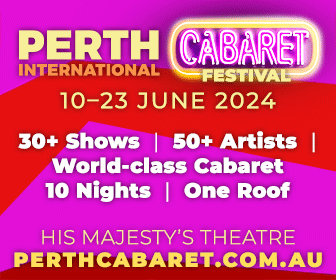 A drag queen. A poet. A performer. A statement. Odidiva – the only live act black drag queen in Cape Town – is all of these in House of the Holy Afro, the raucous, rhythmic journey through urban African culture that will be at Beck’s Music Box as part of the Perth International Arts Festival on February 26-27.
A drag queen. A poet. A performer. A statement. Odidiva – the only live act black drag queen in Cape Town – is all of these in House of the Holy Afro, the raucous, rhythmic journey through urban African culture that will be at Beck’s Music Box as part of the Perth International Arts Festival on February 26-27.
As Odidi Mfenyana (the man behind the makeup of Odidiva) explains, Odidiva was born when he met Brett Bailey, the director of House of the Holy Afro, at a bar back in 2001. Brett saw Odidi sing karaoke and offered him a part in a play. Though originally suspicious the offer was simply a bad pickup line, Odidi eventually agreed and so Odidiva came to be.
In the years since, Odidiva has grown quite a following, even performing at MCQP (Mother City Queer Project – South Africa’s answer to Mardi Gras). As a performer, she can be camp, flippant and downright hilarious with the best of them, often ranting or raving for effect, about a range of topics. Calling down the line from Cape Town, Odidi gives me a glimpse of his alterego when he switches into character and begins a little diatribe on the current gay fashion.
‘What is up with this whole Abercrombie and Fitch with sneakers look? Where is the glam? Why do they want to look as straight as possible? I know we all want to shag a frat boy, but do we have to dress like one?’
Yet, there is something far more profound and deeper about Odidi and Odidiva. A spoken word poet, Odidi penned most of the words in House of the Holy Afro, and those words form powerful statements about the meaning and the redefinition of what it means to be African. Asked about the show, Odidi becomes the slam poet.

The afro is not a symbol. It odes not gesticulate or perpetrate or instigate. The afro is the big black truth as opposed to the little white lie. The afro is African.
Odidi, then, stops his performance and explains, ‘That’s the main poem of the show and it’s where the title came from. That’s essentially what we try to do, tell people – listen here, black urban culture begins exactly where it started – in Africa.’
That seems logical enough, but the culture House of the Holy Afro represents is rarely credited to the African continent. From hip-hop to gospel, African culture has been African-Americanized. As House of the Holy Afro contextualizes African culture to Africa, one surprising element that comes out (pardon the pun) loud and clear is camp gay subculture – something Odidiva jokingly refers to as Afrokitsch. That gay element of urban Africa, particularly urban South Africa, is integral to the show.
‘There is a vibrant gay scene in South Africa mainly because of the Constitution. That has given a lot of freedom and opportunity for people to have self-determination. We have a lot of refugees in our country from the rest of the continent who come specifically to South Africa because they can’t be themselves in their country,’ says Odidi.
Yet, for all South Africa’s progressive policies, there is still a gap between the openness of the white gay community and the all-too-often invincibility of the black gay community, something that makes House of the Holy Afro’s and its portrayal of urban culture and black gay Africa, all the more powerful.
‘There is that feeling that there is the white gay scene rather than everybody’s scene,’ explains Odidi, ‘so I try to blend where I come from and where I am right now with everything else, bring my own perspective to it.’
Perspective and poetry, drag and glam – House of the Holy Afro is ‘absolute’ madness and a very loud statement from one of the continent’s great contemporary poets and performers about what Africa is.
Megan Smith




